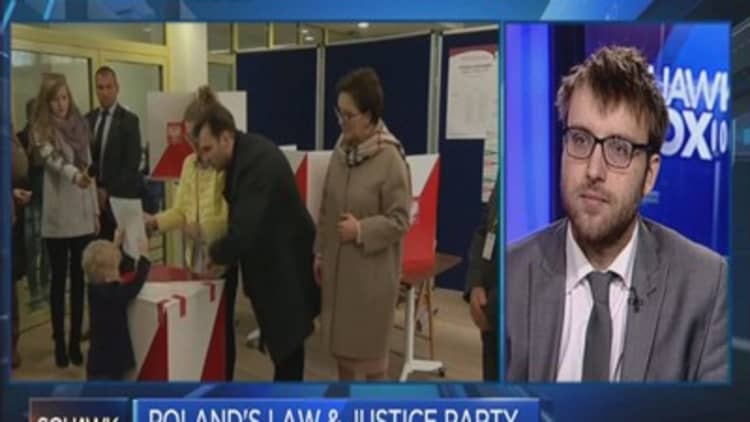
The triumph of the conservative, anti-immigration Law and Justice party (PiS) in Poland's elections at the weekend demonstrates how the refugee crisis could play into the hands of anti-European Union parties.
Jaroslaw Kaczynski, the head of euroskeptic Law and Justice, whose twin brother Lech famously died in a plane crash while president of Poland, played on the electorate's fears during the campaign by claiming that refugees were bringing diseases like cholera and dysentery to Europe.
The party won with 39.1 percent of the vote, far ahead of governing Civic Platform, the party of the President of the European Council Donald Tusk, on 23.4 percent.
"I don't think the party really wants to leave Europe, they just want Poland to be more assertive when it comes to things like Europe's response to the refugee crisis," Pawel Swidlicki, a research analyst at Open Europe, told CNBC Monday.
"Kaczynski has made no secret of his admiration for (right-wing Hungarian Prime Minister Viktor) Orban and his desire to imitate his policies in the past, although that has waned slightly since Orban moved closer to Putin."
Orban has been one of the most hardline voices calling for the EU to limit the number of refugees it admits in recent months. Close to 700,000 people, many of whom are fleeing conflict in the Middle East, have entered Europe so far this year, according to International Organization for Migration data. Many are trying to travel to countries in the north and west of the continent, like Germany, via eastern European states like Hungary or Slovenia, which have little experience with mass migration and are often struggling economically themselves.
Of course, there are other reasons for PiS's triumph, including scandal at the top of Civic Platform involving bugged restaurant conversations.
"Even though economic performance has been strong, far too many Poles feel like their economic prospects aren't good enough. Far too many feel that they have to go abroad to pursue opportunities," Swidlicki added.
Poland is not the only election where the ripples could be felt beyond its national borders. The aftermath of elections in Portugal earlier this month have proved controversial, and were even criticized as anti-democratic.
The country's president called on the (also right-leaning) incumbent Prime Minister Pedro Passos Coelho to form a minority government, rather than offering the opportunity to rival, left-leaning and euroskeptic parties. Coelho's party, the Social Democratic Party, won most seats in Portugal's parliament in the election, yet some felt that the other coalition should have been given a chance to form a government.
- By CNBC's Catherine Boyle




